Understanding the Wyoming Draw
Wyoming provides a plethora of hunting opportunities for residents and nonresidents alike. The state's terrain affords an opportunity to chase antelope and mule deer in sage brush flats or go after high mountain elk and goats. The demand for hunting opportunities from residents and nonresidents alike is greater than the population of animals in the state can sustain if everyone got to hunt. So like many western states, a draw system was devised to allocate hunting opportunities. Wyoming preference points have been around for 25 years. However, like many western states Wyoming’s regulations can be a little overwhelming to the uninitiated. Luckily, we here at HuntScore love this stuff! We’ll break down the state’s tag allocation process so you can draw the tag you’ve been waiting for!
Resident vs. NonResident
Wyoming, like most states, has different rules for residents vs. nonresidents. Residents are afforded the most opportunity. Typically up to 75% or 80% of available tags go to residents in the initial draw depending on the species. Wyoming residents also have access to more over-the-counter tag options. This means they do not have to apply for a limited number of tags. In addition to OTC tags, residents also do not have a preference point system for deer, elk and antelope seasons. Only a random draw system is in place.
| Species | Resident | NonResident |
|---|---|---|
| Antelope | Random Draw | Random Draw & Preference Point |
| Deer | Random & OTC | Random Draw & Preference Point |
| Elk | Random Draw & OTC | Random Draw & Preference Point |
| Bear | OTC | OTC |
| Moose | Random Draw & Preference Point | Random Draw & Preference Point |
| Mountain Goat | Random Draw | Random Draw |
| Bighorn Sheep | Random Draw & Preference Point | Random Draw & Preference Point |
| Bison | Random Draw | Random Draw |
| Wolf | OTC | OTC |
| Mountain Lion | OTC | OTC |
Preference Points vs. Random Draw
Wyoming Game and Fish allocates tags through two types of draws: a preference point draw and a random draw. Preference points can be purchased every year and accumulate over time. The more preference points one has the more likely one is to draw a tag in the preference point draw. Wyoming awards preference points for deer, elk, antelope, sheep and moose. Once you start accumulating or “building points” it's important to know details about how they are used, when you can lose them, etc… We’ll explore that in another article, but for now, know that we’ll stick to the basics. The graph below shows accumulated preference points across different species. One final point is that 75% of tags go to preference point drawings while 25% go to random draw. So accumulating points gives you the best opportunity to hunt. Below is a breakdown of accumulations across species.
Preference Points Held Going Into 2020 Draw
The random draw is just that, a random draw where every individual has an opportunity to draw. While some states give extra weight to those with more preference points, Wyoming’s random draw is unweighted. Meaning the guy who has 12 preference points and the guy who just applied this year have equal odds in the random drawing. HuntScore owner, Matt Habiger, was lucky enough to draw a 1 in 200 odds tag for unit 64-1 Antelope in 2019 with 0 preference points! You can see a short clip of his 2019 Western Hunting season here.
Special Preference Point Draw
Wyoming also has what they call a Special Preference Point draw for nonresidents. Basically, if you have the means to pay double the tag price...you are special and get to put in a pool separate from the general preference point draw. Of the 75% of tags allocated for preference points, typically 40% of these will go toward the special preference point draw. So if the quota was 100 tags for nonresidents, 75 would be available for the preference point draw. Then 30 of those 75 (40% of 75) would be available in the special preference point draw.
Choices
When applying, you’ll also be presented with the ability to select up to 3 huntcodes you’d like to apply for. It is not necessary to select 3 but is an option. In the preference point phase of the drawing, all 1st Choice selections are considered 1st. If you draw your 1st choice, in either the preference point or random draw, your preference points will be used and zeroed out. So next year you start over at zero because you also cannot purchase a preference point the same year you draw. However, if you were to draw as a 2nd or 3rd choice then your preference points would be maintained! So point building strategies exist that can allow you to hunt every year and build points. It can be near impossible to find hunts for trophy class animals but if you just want to fill the freezer and build points, that strategy is entirely doable.
Reduced Price Licenses
Reduced price licenses also offer an opportunity to hunt and not burn bonus points. All reduced price licenses can be applied for as a 1st choice and they will not use up an applicants bonus points. If a unit you are thinking about burning bonus points on offers a reduced price option for cow/calf or doe/fawn, you might consider doing so to scout the unit and fill your freezer.
Putting It Together
Real examples are always the best. So here is a walk through of how a guy or gal with 1 preference point would fair in a nonresident drawing for Unit 34-1 to hunt elk. We will assume 34-1 is their first choice.

We can see the quota for 034-1 is 764 tags. For elk, nonresidents tag pools are typically 15% of the available allocation. In this case, that means 117 licenses are available for nonresidents. Of those 117 licenses, 75% will be allocated to preference point holders while 25% will be allocated to the random draw.
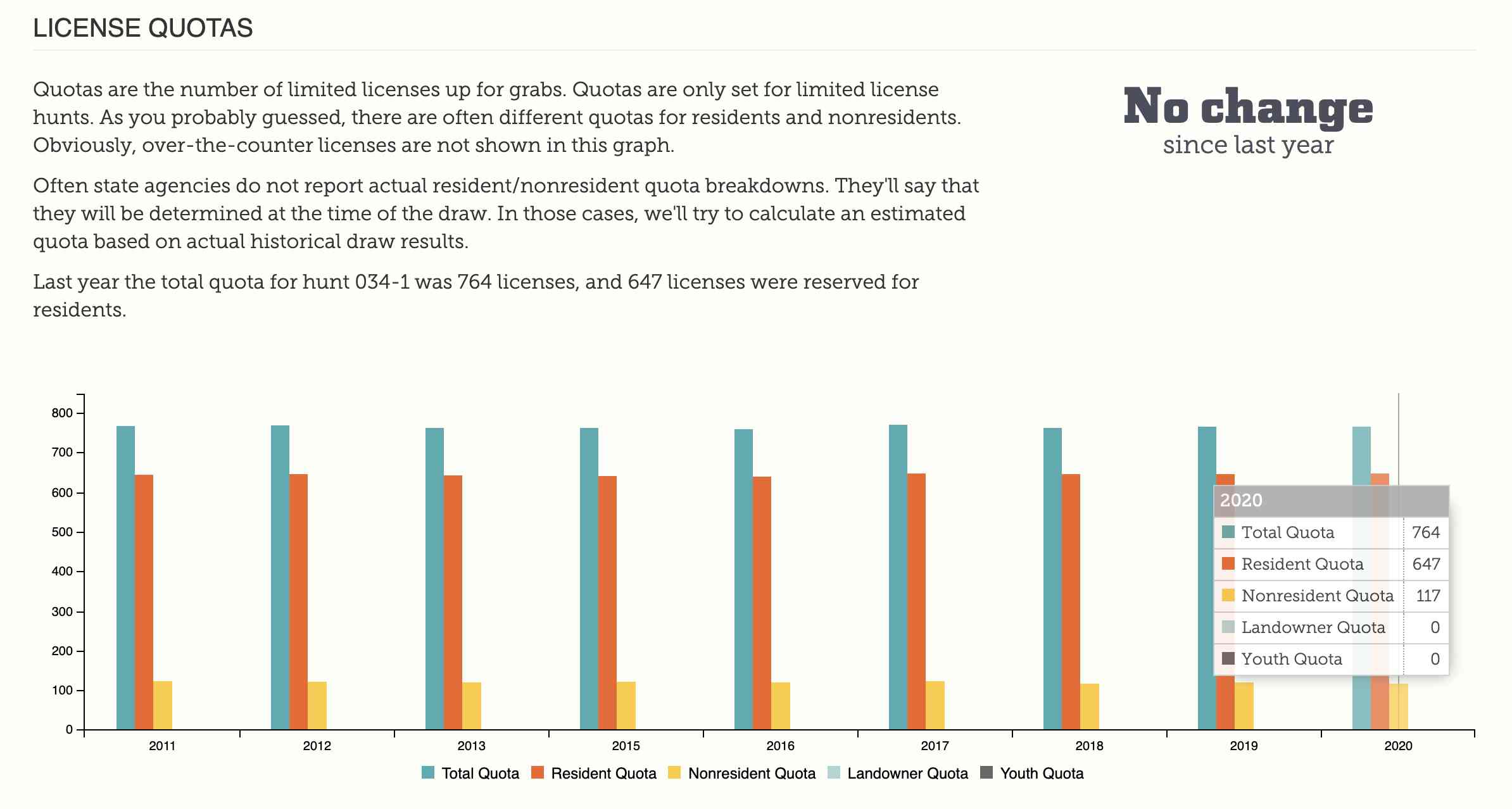
Of the 117 licenses 89 were made available to preference point holders (slightly over the 75%). These 53 (59.5%) were allocated to General Preference points while 36 (40.5%) were allocated to Special Preference point holders.
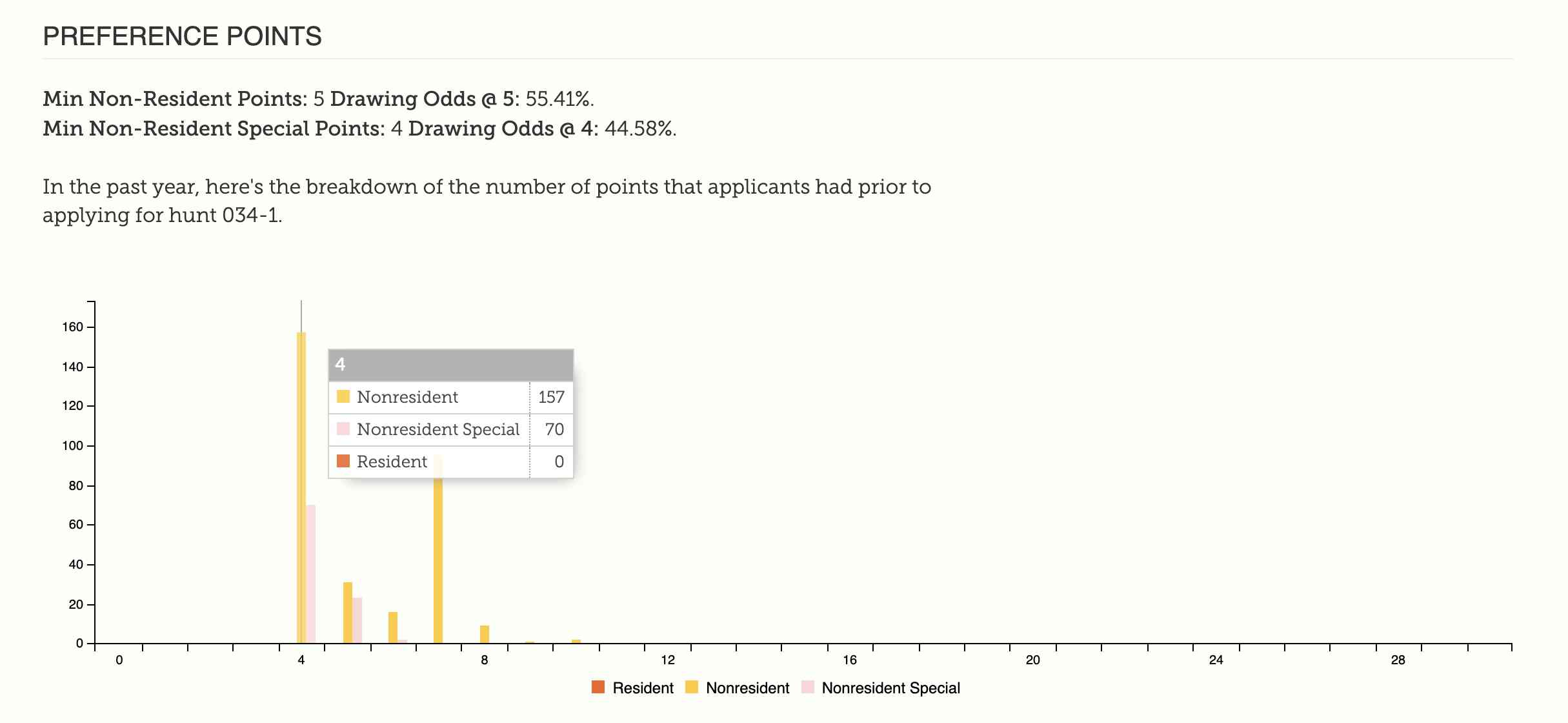
Special preference point holders only needed 4 points to draw while general preference holders needed 5 points to draw. However, even holders at these respective point minimums were not guaranteed to draw. Others had the same number of points which gave point holders around a ~50% chance of drawing.
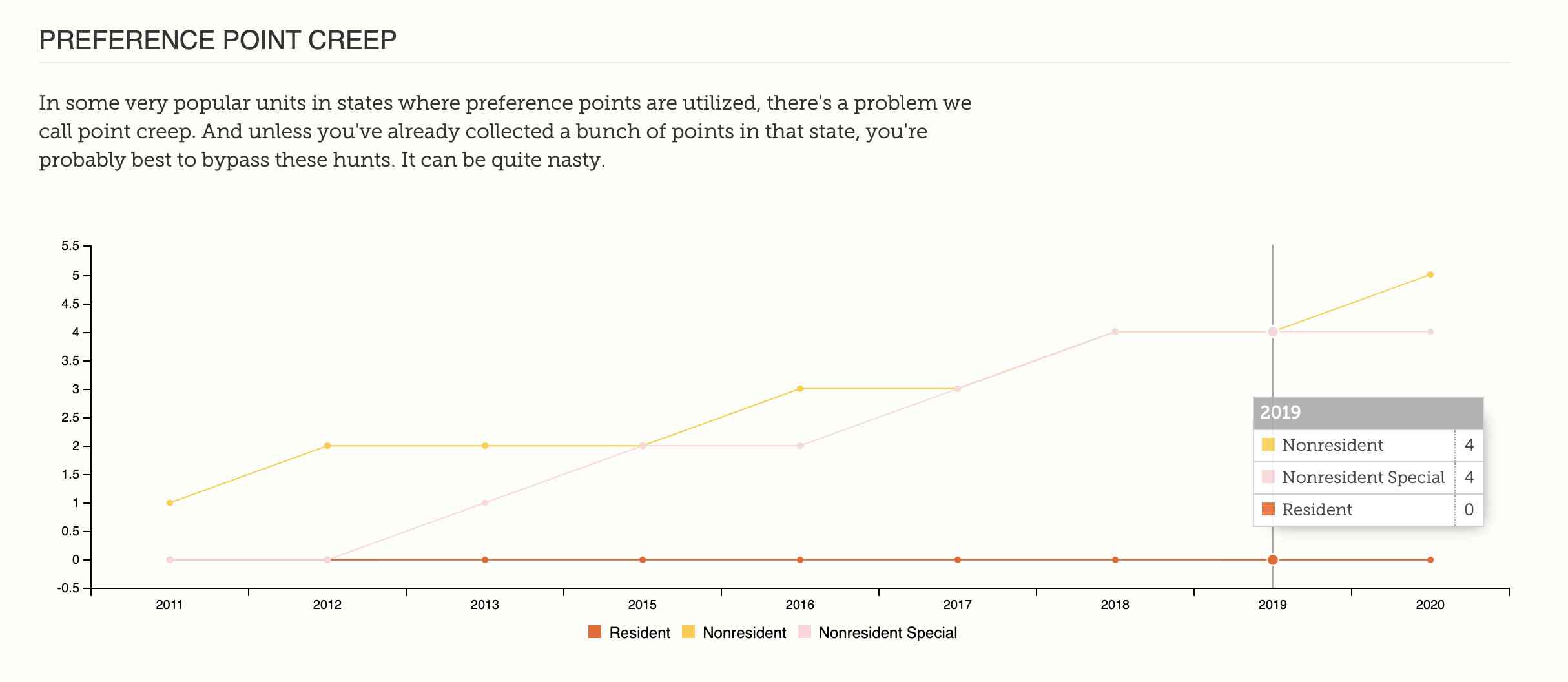
Point creep in the unit has been increasing year-over-year for the past decade. Nonresident special minimums have tended to be slightly better than nonresident general but fluctuate from year to year.
So our applicant with 1 point only never really had a shot in the preference point draw. However he or she does have a shot of drawing in the 25% random draw. Their application will be added to the pool with all other unsuccessful nonresident applicants and drawn at random. We can see that there were 159 applicants in the general nonresident random draw and 59 applicants in the nonresident special random draw.
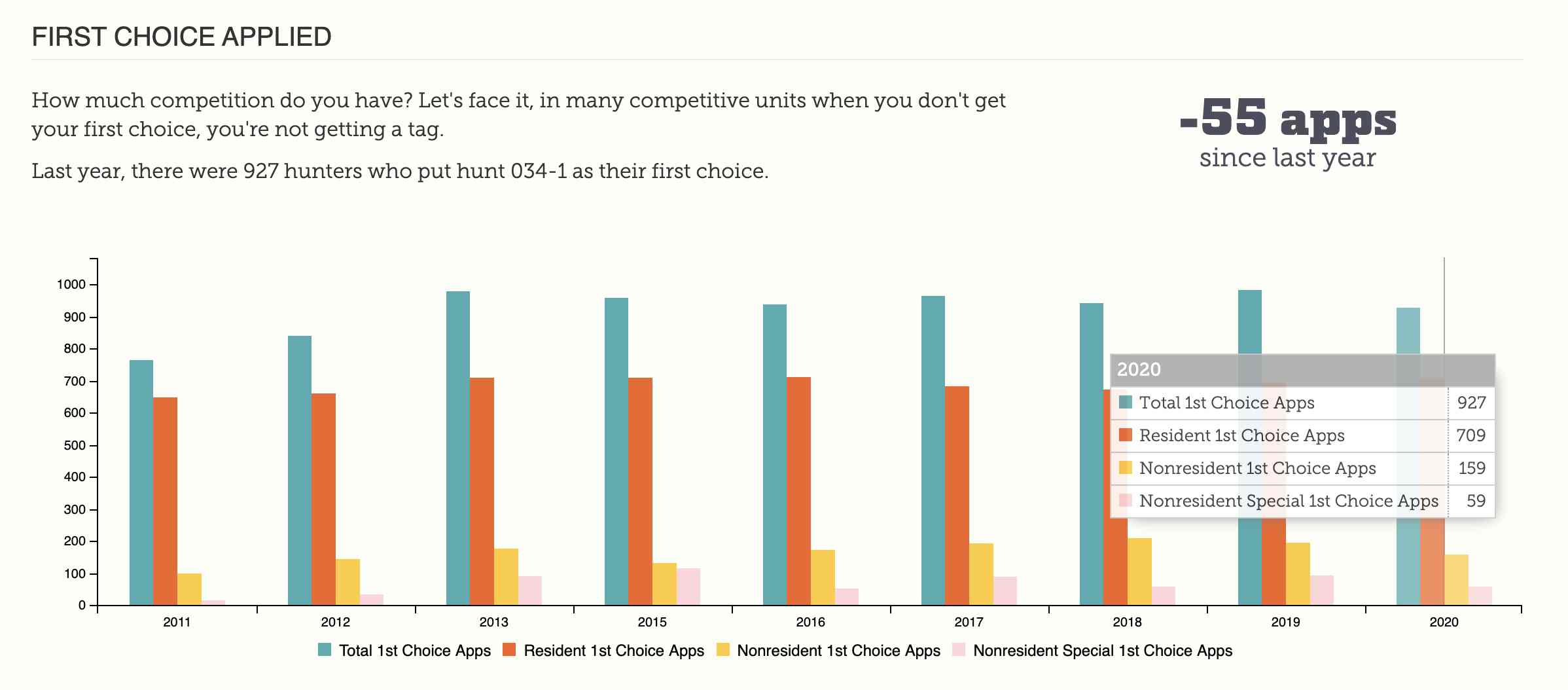
The remaining 28 tags that were not allocated to the preference point pool are again divided up 60/40. 17 tags are available for the general random draw and 11 for the special random draw. At this point, applicants in the special random draw have a higher chance of drawing because there were fewer applicants relative to the available tag pool. So those 59 remaining applicants have an 18.6% chance of drawing 1 of the remaining 11 tags. Whereas the 159 remaining applicants in the general draw have around a 10.6% chance of drawing one of the 17 tags left.
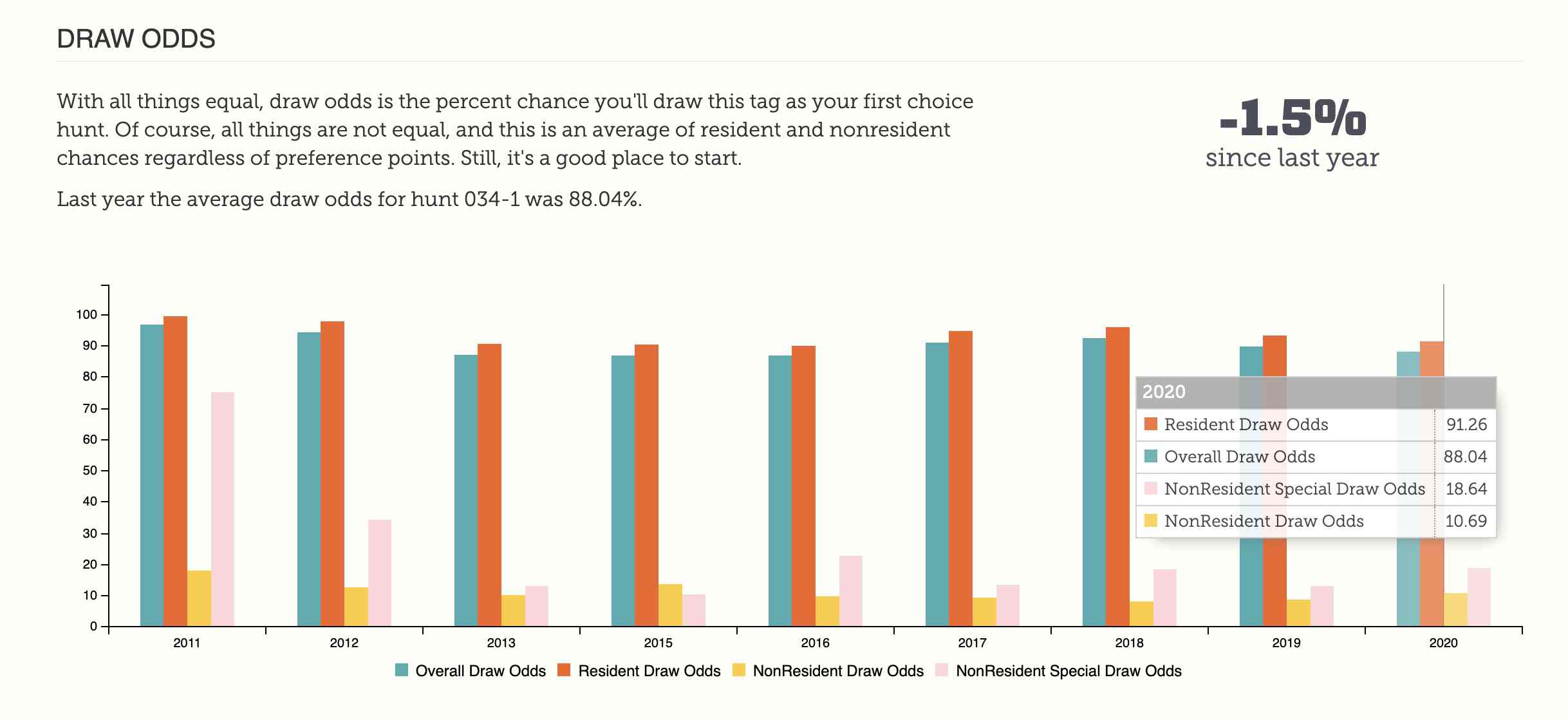
Wyoming offers the best of both worlds through a split system. Building preference points allows those looking for an exceptional hunt to build points and use them on some premier hunts. However, you always have a chance at drawing in the random draw. So it is best to only select a hunt you truly want for your 1st choice application since there is always a nonzero chance you could draw!